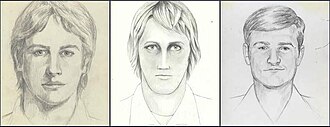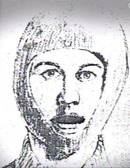- EVENTUALLY DE ANGELO RETIRED SCOTT-FREE AND WAS BAGGED, BY CHANCE, ONLY AFTER RETIRMENT.
The Golden State Killer is an American serial killer, serial rapist, burglar, and former police officer who committed at least 13 murders, more than 50 rapes, and over 100 burglaries in California between 1974 and 1986.[4][5][6] Joseph James DeAngelo Jr. (born November 8, 1945) is a United States Navy veteran and worked in law enforcement from 1973 to 1979. He pled guilty to the 13 murders of the Golden State Killer in June 2020.[7] He was responsible for at least three crime sprees throughout California, each of which spawned a different nickname in the press, before it became evident that they were committed by the same offender. He began as a burglar (the Visalia Ransacker) before moving to the Sacramento area, where he was known as the East Area Rapist and was linked by modus operandi to additional attacks in Contra Costa County, Stockton, and Modesto.[8][9] He was later known for his southern California crimes as the Original Night Stalker (Richard Ramirez later receiving the "Night Stalker" nickname). DeAngelo carried out most rapes and murders through hot prowl burglaries of couples or families, in which he kidnapped and extorted victims. He taunted and threatened victims and police in obscene phone calls, and possibly written communications.
During the decades-long investigation, several suspects were cleared through DNA evidence, alibi, or other investigative methods.[2][10] In 2001, DNA testing indicated that the East Area Rapist and the Original Night Stalker were the same person, giving him the moniker EARONS (eer-onz).[5] The case was a factor in the establishment of California's DNA database, which collects DNA from all accused and convicted felons in California[11] and has been called second only to Virginia's in effectiveness in solving cold cases.[12] To heighten awareness that the uncaught killer operated throughout California, crime writer Michelle McNamara coined the name Golden State Killer in early 2013.[5]
The Federal Bureau of Investigation (FBI) and local law-enforcement agencies held a news conference on June 15, 2016, to announce a renewed nationwide effort, offering a $50,000 reward for his capture.[13] On April 24, 2018, authorities charged 72-year-old DeAngelo with eight counts of first-degree murder, based upon DNA evidence.[14][15] Specifically, investigators identified members of DeAngelo's family through the use of forensic genetic genealogy.[16] This was also the first announcement connecting the Visalia Ransacker crimes to DeAngelo.[17] Owing to California's statute of limitations on pre-2017 rape cases,[18] DeAngelo cannot be charged with 1970s rapes,[19] but he was charged in August 2018 with 13 related kidnapping and abduction attempts.[20] On June 29, 2020, DeAngelo pleaded guilty to multiple counts of murder.[21] As part of the plea bargain, DeAngelo was also required to admit to crimes he had not been formally charged with, including rape.[22]
Joseph James DeAngelo Jr.[edit]
DeAngelo was born on November 8, 1945, in Bath, New York, to Joseph James DeAngelo Sr., a US Army Sergeant, and Kathleen Louise Bosanko.[23] He has two sisters and a brother, all younger than him. A relative reported that when DeAngelo was 9 or 10 years old he witnessed his 7-year-old sister being raped by two airmen in a warehouse in West Germany, where the family was stationed at the time.[24]
Between 1959 and 1960 he attended Mills Junior High School in Rancho Cordova. Beginning in 1961, he attended Folsom High School, from which he received a GED certificate in 1964. He played on the school's junior varsity baseball team.[25][26]
DeAngelo joined the U.S. Navy in September 1964,[27] and served for 22 months during the Vietnam War as a damage controlman on the cruiser USS Canberra[28] and USS Piedmont.[29] Beginning August 1968, DeAngelo attended Sierra College in Rocklin, California; he graduated with an associate degree in police science, with honors.[30]
In May 1970, DeAngelo became engaged to Bonnie Jean Colwell, a classmate at Sierra College, but she reportedly broke off the relationship. Investigators believe this might be connected to the offender's saying, "I hate you, Bonnie!", during one of the attacks.[31][32]
In 1971, he attended Sacramento State University, where he earned a bachelor's degree in criminal justice.[26][27] He later took post-graduate courses[27] and further police training at the College of the Sequoias in Visalia, then completed a 32-week police internship at the Roseville Police Department.[33][34]
From May 1973 to August 1976, he was a burglary unit police officer in Exeter (a town of about 5,000 people, near Visalia),[35] having relocated from Citrus Heights.[25][34] By 1976, DeAngelo had been promoted to sergeant and was in charge of the Exeter Police Department's "Joint Attack on Burglary" program.[36] He then served in Auburn from August 1976 to July 1979, when he was arrested for shoplifting a hammer and dog repellent; he was sentenced to six months probation and fired that October.[31][37]
In November 1973, he married Sharon Marie Huddle in Placer (now known as Loomis). In 1980, they purchased the house in Citrus Heights where he was eventually arrested.[29] Huddle became an attorney in 1982, and they had three daughters, two of whom were born in Sacramento and one in Los Angeles, before the couple separated in 1991. In July 2018, Huddle filed for a divorce.[25][32][38]
His employment history in the 1980s is unknown.[31] From 1990 until his retirement in 2017, he worked as a truck mechanic at a Save Mart Supermarkets distribution center in Roseville.[25][39] He was arrested in 1996 over an incident at a gas station; the charge was dismissed.[40]
His brother-in-law said that DeAngelo casually brought up the East Area Rapist in conversation around the time of the original crimes. Neighbors reported that DeAngelo frequently engaged in loud, profane outbursts.[37] One neighbor reported that his family received a phone message from DeAngelo threatening to "deliver a load of death" because of their barking dog.[41] He was living with a daughter and granddaughter at the time of his arrest.[31]
Crimes[edit]
DNA evidence links the Golden State Killer to eight murders in Goleta, Ventura, Dana Point, and Irvine; two other murders in Goleta, lacking DNA evidence, are linked by modus operandi.[42][43] Investigators suspect the same killer was involved in three other murders: two in Rancho Cordova, and one in Visalia.[2] The offender also committed more than 50 known rapes in the California counties of Sacramento, Contra Costa, Stanislaus, San Joaquin, Alameda, Santa Clara, and Yolo, in addition to hundreds of incidents of burglaries, thefts, vandalism, peeping, stalking, and prowling.[44]
Visalia Ransacker (April 1974 – December 1975)[edit]
It was long suspected that the training ground of the criminal who became the Golden State Killer was Visalia, California[45][46][47][48] (although earlier Visalia crimes dating back as early as May 1973 and other sprees like the 'Cordova Cat Burglar'[49] or the 'Exeter Ransacker',[50] as well as burglaries that took place after the McGowen shooting, are now suspected to be linked as well).[35][51] Over a period of 20 months, the Ransacker is believed to have been responsible for one murder and around 120 burglaries.[52] Most of the Ransacker's activities involved breaking into houses, going through (or vandalizing) the owners' possessions, scattering women's underclothing, stealing coins and low-value or personal items, while often ignoring banknotes and other valuable items in plain sight.[53]
In late April 2018, the Visalia chief of police stated that while there is no DNA linking DeAngelo to the Central Valley cases, his department has other evidence that will play a role in the investigation, and that he was "confident that the Visalia Ransacker has been captured."[54] Though the statutes of limitations for the burglaries have each expired,[8][55] DeAngelo was formally charged on August 13, 2018, with the first degree murder of Claude Snelling in 1975.[55][56] In 2020, DeAngelo pleaded guilty to the murder of Claude Snelling, confirming that he was the Visalia Ransacker.[57]
East Area Rapist (June 1976 – July 1979)[edit]
The Golden State Killer was believed to have moved to the Sacramento area, progressing from burglary to rape in mid-1976.[citation needed] The crimes initially centered on the then-unincorporated areas of Carmichael, Citrus Heights and Rancho Cordova, east of Sacramento.[6] His initial modus operandi was to stalk middle-class neighborhoods at night in search of women who were alone in one-story homes, usually near a school, creek, trail or other open space that would provide a quick escape.[58] He was seen a number of times, but always successfully fled; on one occasion, he shot and seriously wounded a young pursuer.[2]:187–188
Most victims had seen (or heard) a prowler on their property before the attacks, and many had experienced break-ins. Police believed that the offender would conduct extensive reconnaissance in a targeted neighborhood — looking into windows and prowling in yards — before selecting a home to attack. It was believed that he sometimes entered the homes of future victims to unlock windows, unload guns, and plant ligatures for later use. He frequently telephoned future victims, sometimes for months in advance, to learn their daily routines.[5][60]
Although he originally targeted women alone in their homes or with children,[10][61] the offender eventually preferred attacking couples.[10][62] His usual method was to break in through a window or sliding glass door and awaken the sleeping occupants with a flashlight, threatening them with a handgun.[10] Victims were then bound with ligatures (often shoelaces) which he found or brought with him, blindfolded and gagged with towels which he had ripped into strips. The female victim was usually forced to tie up her male companion before she was bound.[63] The bindings were often so tight that the victims' hands were numb for hours after being untied.[2]:434 He separated the couple, often stacking dishes on the male's back and threatening to kill everyone in the house if he heard them rattle. He moved the woman to the living room and often raped her repeatedly, sometimes for several hours.[10][63][64]
The offender sometimes spent hours in the home ransacking closets and drawers,[65] eating food in the kitchen, drinking beer, raping the female again or making additional threats. Victims sometimes thought he had left the house before he "jump[ed] from the darkness."[63] The offender typically stole items, often personal objects and items of little value but occasionally cash and firearms. He then crept away, leaving victims uncertain if he had left. The offender was believed to escape on foot through a series of yards and then use a bicycle to go home or to a car, making extensive use of parks, schoolyards, creek beds and other open spaces which kept him off the street.[2]
The rapist operated in Sacramento County from the first attacks in June 1976 until May 1977. After a three-month gap, he struck in nearby San Joaquin County in September before returning to Sacramento for all but one of the next ten attacks. The rapist attacked five times during the summer of 1978 in Stanislaus and Yolo counties before disappearing again for three months. Attacks then moved primarily to Contra Costa County in October and lasted until July 1979.










No comments:
Post a Comment